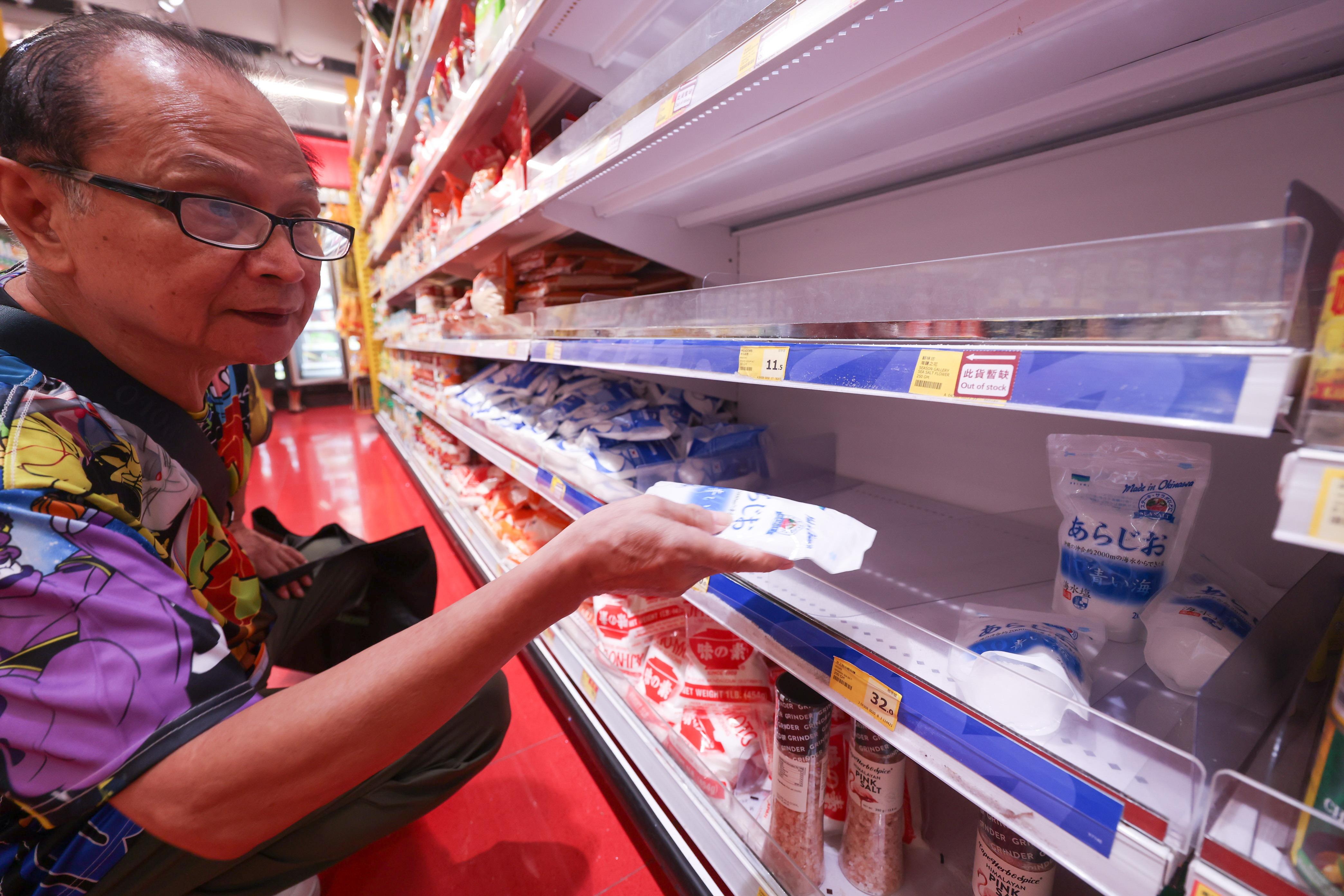 A Hong Kong resident is seen looking for table salt in Tseung Kwan O on Aug 25, 2023, as people rushed to supermarkets to buy salt following reports of panic-buying on the Chinese mainland. (CALVIN NG /CHINA DAILY)
A Hong Kong resident is seen looking for table salt in Tseung Kwan O on Aug 25, 2023, as people rushed to supermarkets to buy salt following reports of panic-buying on the Chinese mainland. (CALVIN NG /CHINA DAILY)
HONG KONG – The governments of the Hong Kong and Macao special administrative regions urged the public not to stockpile table salt as supplies in the region are sufficient amid panic-buying on the Chinese mainland that is beginning to spread to the two SARs.
In response to an inquiry from China Daily on Friday, Hong Kong’s Environment and Ecology Bureau has assured the public that there is no shortage of table salt in the region.
The Bureau said major supermarkets have confirmed they have a stable supply of table salt, with sufficient inventory.
Some of the city’s supermarkets on Friday afternoon begin to see their shelves of table salt being emptied as some residents rushed to stock up on supplies after work.
The Bureau, in a written reply, said the delay in restocking the shelves was caused by a lack of personnel at supermarkets, rather than a shortage of salt.
READ MORE: Concerns persist in HK as most Japanese seafood banned
The Bureau’s spokesperson added that the affected supermarkets are addressing this issue and will replenish the shelves promptly, alleviating residents’ concerns.
Data from the government’s Census and Statistics Department, showed that China, Malaysia, and Australia are the primary sources of table salt in the city. Salt from Japan constitutes less than 1 percent of the overall supply.
On Thursday evening, shelves of table salt at some supermarkets in Macao were nearly emptied, leaving only a few containers of higher-priced sea salt at those stores
In an effort to maintain calm and dispel rumors, the spokesperson urged residents to remain composed and rational. It was emphasized that an excessive intake of iodine and sodium (salt) can have negative health implications, according to the Centre for Food Safety of the HKSAR government.
On Thursday evening, shelves of table salt at some supermarkets in Macao were nearly emptied, leaving only a few containers of higher-priced sea salt at those stores.
The Economic and Technological Development Bureau of the Macao Special SAR government on Thursday reassured residents that the supply of table salt remains stable, with ample inventory available. It urged the public to remain rational and not succumb to unfounded rumors.
According to the ETDB, Macao currently has a stockpile of over 190,000 kilograms of table salt, sufficient to meet the needs of the city’s population for about 37 days.
The ETDB said it has established that the current supply chain is stable and will continue to make the necessary purchases. It has emphasized its commitment to monitoring the situation closely, conducting regular market inspections, and acting promptly against any price manipulation or hoarding.
A key driver behind the hoarding of table salt is the mistaken belief that iodized salt contains iodate that can help the human body resist radiation. Hong Kong’s Centre for Food Safety said on a social media platform on Friday there is no scientific evidence that consuming iodized salt can prevent radiation. However, taking an excessive amount of iodate and sodium, another element of table salt, could harm people’s health, it cautioned.
Iodide tablets are not an antidote for radiation as they can’t prevent the human body from absorbing radioactive substances, other than radioactive iodine, it said.
Hong Kong at this moment is not seeing extensive stockpiling of salt by residents, President of the Hong Kong Federation of Restaurants and Related Trades Simon Wong Ka-wo told China Daily.
Wong said most of the salt used by Hong Kong families comes from the Chinese mainland and Southeast Asia, with a tiny portion – that is mostly used in Japanese restaurants, being shipped from Japan.
The discharge of nuclear-contaminated wastewater has shaken public confidence in the safety of Japanese food, crippling already-hard-hit Japanese restaurants in the city, leading to a further 30-percent drop in business, Wong noted.
This is likely to cause quite a few Japanese restaurants to close, he cautioned. Wong suggested that restaurants buy ingredients from the mainland in order to allay consumers’ fears.
The city’s salt supply is of no concern for Ken Leung, owner of a Japanese barbecue diner in Tsim Sha Tsui, and Agnes Cheung, who owns a Korean restaurant. Leung said his restaurant ceased using costly table salt from Japan long ago. The salt is mainly locally produced and the foods are mainly from Canada, Malaysia and Europe, he said.
ALSO READ: HK details import ban on Japan seafood due to nuke water plan
Cheung, who has been monitoring the stockpiling of ingredients in supermarkets, said the salt used in the restaurant is mostly from South Korea or locally produced.
Some residents in Hong Kong distanced themselves from those who are hoarding salt. A female surnamed Wong, who visited a ParknShop supermarket in Hung Hom, and Yang Huayu both said there is no need to hoard salt.
Also on Friday, the Hong Kong Fishermen’s Youth Association and the New Territories Association of Societies reiterated their anger over Japan’s discharge of wastewater by staging protests outside the Consulate-General of Japan in Hong Kong.


